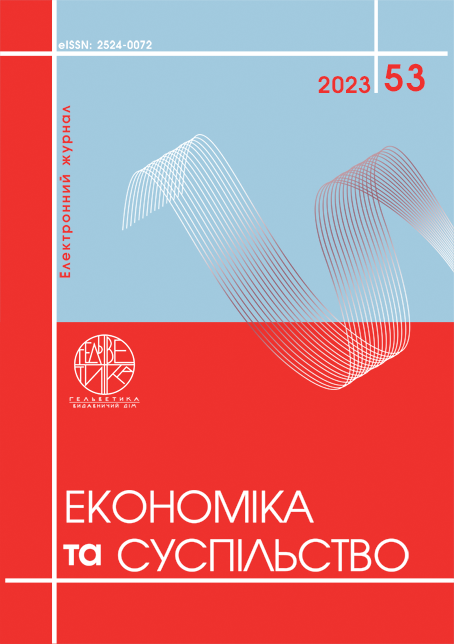ІННОВАЦІЙНІ ТЕХНОЛОГІЇ ТА МЕТОДИ ОЦІНЮВАННЯ РЕЗУЛЬТАТИВНОСТІ УПРАВЛІНСЬКОГО ПЕРСОНАЛУ У РОЗВИТКУ КРЕАТИВНОГО ПОТЕНЦІАЛУ ОРГАНІЗАЦІЇ
Анотація
Представлена стаття присвячена ретельному розгляду ключових аспектів оцінювання управлінського персона з фокусом на стимулюванні розвитку креативного потенціалу підприємства. Зростаюча конкуренція, розвиток інформаційних технологій та швидка зміна ринкових умов актуалізують дослідження з цього напряму. Успішність оцінки управлінського персоналу визначається його відповідністю стратегічним цілям організації, а також конкурентоспроможністю та здатністю генерувати інноваційні рішення в умовах цифровізації. Особлива увага у статті приділяється створенню контрольного середовища організації, що допомагає забезпечити об'єктивність та структурованість оцінки та аналізу результативності діяльності управлінського персоналу. Проаналізовано найбільш поширені методи оцінювання результативності управлінського персоналу та визначено, що їх комбінування з урахуванням конкретних особливостей організації забезпечує більш об'єктивну та точну оцінку. Запропоновано методичну основу для вибору методів та інноваційних технологій щодо оцінювання результативності управлінського персоналу у розвитку креативного потенціалу організації. Обґрунтовано, що процес вибору методів оцінки є унікальним, вимагає глибокого аналізу та зваженого підходу з урахуванням особливостей внутрішнього середовища організації, її бізнес-моделі, розміру, стратегічних цілей та інших факторів впливу. Регулярна оцінка результативності управлінського персоналу організації допомагає виявити потенціал для її креативного розвитку, створити індивідуальні плани розвитку та забезпечити відповідність управлінської команди потребам підприємства.
Посилання
Schleicher D., Baumann H., Sullivan D., Yim J. Evaluating the effectiveness of performance management: A 30-year integrative conceptual review. Journal of Applied Psychology. 2019. № 104(7). Р. 851. DOI: https://doi.org/10.1037/apl0000368
Tweedie D., Wild D., Rhodes C., Martinov‐Bennie N. How does performance management affect workers? Beyond human resource management and itscritique. International Journal of Management Reviews. 2019. № 21(1). Р. 76–96. DOI: https://doi.org/10.1111/ijmr.12177
Murphy K. Performance evaluation will not die, butitshould. Human Resource Management Journal. 2020. № 30(1). Р. 13–31. DOI: https://doi.org/10.1111/1748-8583.12259
Gajdzik B., Wolniak R. Smart Production Workersin Terms of Creativity andI nnovation: The Implication for Open Innovation. Journal of Open Innovation: Technology, Market, and Complexity. 2022. Vol. 8. Issue 2. DOI: https://doi.org/10.3390/joitmc8020068.
Dipura S., Soediantono D. Benefits of Key Performance Indicators (KPI) and Proposed Applications in the Defense Industry: A Literature Review. International Journal of Social and Management Studies. 2022. № 3(4). Р. 23–33. DOI: https://doi.org/10.5555/ijosmas.v3i4.146
Agarwal V., Shiralkar S., Aaher S., Jawade S. The supply chain management revolution. International journal of engineering research and technology. 2021. №10(10). URL: https://www.researchgate.net/profile/Venkesh-Agarwal/publication/356438894_The_Supply_Chain_Management_Revolution/links/619bac5d3068c54fa5118c38/The-Supply-Chain-Management-Revolution.pdf
Vrontis D., Christofi M., Pereira V., Tarba S., Makrides A., Trichina E. Artificial intelligence, robotics, advanced technologies and human resource management: a systematic review. The International Journal of Human Resource Management. 2022. № 33(6), Р. 1237–1266. DOI: https://doi.org/10.1080/09585192.2020.1871398
Kavanagh, M. J., &Johnson, R. D. (Eds.). Human resource in for mation systems. SAGE Publications, Incorporated. URL: 9781412991667
Milner B., Rapoport V., Yevenko L. The Management Staff and Rationalization of an Enterprise. In: Design of Management Systems in U.S.S.R. Industry. Theory and Decision Library. 1986. Vol. 48. DOI: https://doi.org/10.1007/978-94-009-4626-2_3
Company law and corporate governance. EU rules and activity in this area, Informal Company Law Expert Group, action plan on company law and corporate governance. https://commission.europa.eu/business-economy-euro/doing-business-eu/company-law-and-corporate-governance_en#eu-rules-in-this-area
Нarward business rewieu. Maury Peiperl. Getting 360-Degree Feedback Right. URL: https://hbr.org/2001/01/getting-360-degree-feedback-right
The Balanced Scorecard Institute (BSI). Balanced Scorecard Overview. URL: https://balancedscorecard.org/bsc-basics-overview/
HUMAN RESOURCES MANAGEMENT – 2ND ONTARIO EDITION. Appraisal Methods. URL: https://ecampusontario.pressbooks.pub/humanresourcesmanagementcandianed/chapter/appraisal-methods/
Schleicher D., Baumann H., Sullivan D., Yim J. Evaluating the effectiveness of performance management: A 30-year integrative conceptual review. DOI of Applied Psychology. 2019. № 104(7). Р. 851. URL: https://doi.org/10.1037/apl0000368
Tweedie D., Wild D., Rhodes C., Martinov‐Bennie N. How does performance management affect workers? Beyond human resource management and itscritique. International Journal of Management Reviews. 2019. № 21(1). Р. 76–96. DOI: https://doi.org/10.1111/ijmr.12177
Murphy K. Performance evaluation will not die, butitshould. Human Resource Management Journal. 2020. № 30(1). Р. 13–31. DOI: https://doi.org/10.1111/1748-8583.12259
Gajdzik B., Wolniak R. Smart Production Workersin Terms of Creativity andI nnovation: The Implication for Open Innovation. Journal of Open Innovation: Technology, Market, and Complexity. 2022. Vol. 8. Issue 2. DOI: https://doi.org/10.3390/joitmc8020068.
Dipura S., Soediantono D. Benefits of Key Performance Indicators (KPI) and Proposed Applications in the Defense Industry: A Literature Review. International Journal of Social and Management Studies. 2022. 3(4). Р. 23–33. DOI: https://doi.org/10.5555/ijosmas.v3i4.146
Agarwal V., Shiralkar S., Aaher S., Jawade S. The supply chain management revolution. International journal of engineering research and technology. 2021. № 10(10). Available at: https://www.researchgate.net/profile/Venkesh-Agarwal/publication/356438894_The_Supply_Chain_Management_Revolution/links/619bac5d3068c54fa5118c38/The-Supply-Chain-Management-Revolution.pdf
Vrontis D., Christofi M., Pereira V., Tarba S., Makrides A., Trichina E. Artificial intelligence, robotics, advanced technologies and human resource management: a systematic review. The International Journal of Human Resource Management. 2022. № 33(6). Р. 1237–1266. DOI: https://doi.org/10.1080/09585192.2020.1871398
Kavanagh, M. J., &Johnson, R. D. (Eds.). Human resource in for mation systems. SAGE Publications, Incorporated. URL: 9781412991667.
Milner B., Rapoport V., Yevenko L. The Management Staff and Rationalization of an Enterprise. In: Design of Management Systems in U.S.S.R. Industry. Theory and Decision Library. 1986. Vol. 48. DOI: https://doi.org/10.1007/978-94-009-4626-2_3
Company law and corporate governance. EU rules and activity in this area, Informal Company Law Expert Group, action plan on company law and corporate governance. Available at: https://commission.europa.eu/business-economy-euro/doing-business-eu/company-law-and-corporate-governance_en#eu-rules-in-this-area
Нarward business rewieu. Maury Peiperl. Getting 360-Degree Feedback Right. Available at: https://hbr.org/2001/01/getting-360-degree-feedback-right
The Balanced Scorecard Institute (BSI). Balanced Scorecard Overview. Available at: https://balancedscorecard.org/bsc-basics-overview/
HUMAN RESOURCES MANAGEMENT – 2ND ONTARIO EDITION. Appraisal Methods. Available at: https://ecampusontario.pressbooks.pub/humanresourcesmanagementcandianed/chapter/appraisal-methods/

Ця робота ліцензується відповідно до Creative Commons Attribution 4.0 International License.


